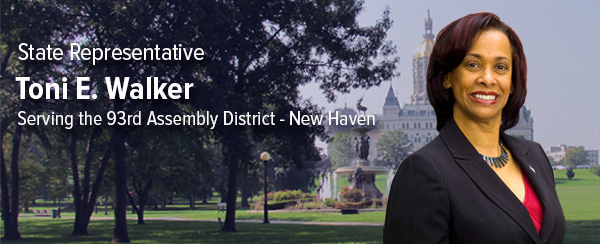
February 8, 2007
LEGISLATIVE COMMITTEE RECOMMENDS RAISING AGE
OF ADULT COURT JURISDICTION
Lays out plan to implement change
Co-Chairs of the General Assembly’s Juvenile Justice Planning and Implementation Committee Sen. Toni Harp (D-New Haven,West Haven), and Rep. Toni Walker announced today the release of the committee’s final report recommending that 16 and 17 year olds be returned to the juvenile court system.
The report cited recent brain research showing that adolescents are still developing their capacity for making judgments. Connecticut is currently one of only three states that tries and incarcerates all 16 and 17 year olds -- even those accused of minor, non-violent crimes -- as adults.
“The experience of 47 states shows us that serving teens in the juvenile system works to prevent future crime. Mixing 16 and 17 year olds with adult prisoners does just the opposite,” said state Senator Toni Harp (D-New Haven), co-chair of the committee.
The committee was charged by the legislature to examine the costs and implications of moving 16 and 17 year olds to the juvenile system. They have been meeting since August with such stakeholders as judges, youth advocates, police officers and attorneys. The committee determined that, with adequate supports in place, moving older teens to the juvenile system could prevent subsequent incarcerations, hospitalizations and other costs. Under the committee’s plan, youths accused of serious crimes could still be tried as adults.
“I am grateful to have had the opportunity to work on an issue of such importance to the youth of our state. I support the move to raise the age of juvenile jurisdiction, as long as the necessary resources are provided -- for the court system and for services for this population -- to make this change a success. Much work lies ahead to prepare the juvenile justice system to handle the older teens, but I am confident that the Committee’s work has laid a solid groundwork for the changes,” said Judge William Lavery, a member of the committee.
The report calls for the change in jurisdiction to go into effect July 1, 2009 thus allowing ample time for affected courts and state agencies to build their capacity to meet the influx of 16 and 17 year olds. The committee was adamant that moving older teens into the juvenile system not dilute the quality or quantity of services available to younger children in the system.
“Our very detailed report comes down to this: Wherever possible we want to prevent young people from getting into trouble. If they do make mistakes, we want to hold them accountable in a setting that will teach them to live up to better standards,” said state Rep. Toni Walker, co-chair of the committee.
The Committee’s other recommendations include:
Improve court diversion and pre-trial detention practices.
The legislators found that approximately 30 percent of youth held in detention while awaiting adjudication are accused of minor non-violent crimes. The cost of a detention bed is in excess of $100,000 per year. They propose an objective risk-assessment tool to determine which youth might be safely released into less restrictive settings at significant cost savings.
Establish Regional Youth Courts.
Using existing or planned juvenile court space to save on brick and motor costs, the committee recommends a separate processing system for 16 and 17 year olds.
Phase in services and staffing.
Providing timely and appropriate services to families will dramatically reduce the number of 16 and 17 year olds who become court-involved. In calling for legislation to take effect in July of 2009, the committee gives state agencies time to develop programs to meet this need.
Establish a Policy and Operations Coordinating Council.
Prior to July, 2009, the Council will oversee implementation of the central components of the plan: development of a statewide detention risk-assessment instrument; roll-out of the Regional Youth Courts Plan; and implementation of a comprehensive system of community-based and residential services for the population served by the juvenile court.
The Juvenile Justice Planning and Implementation Committee is comprised of co-chairs Sen. Toni Harp and Rep. Toni Walker and members Portia Bonner, Ph.D., Joyce Bosco, William Carbone, Fran Carino, Jeff Carr, Donald Devore, Rep. Robert Farr, Sen. Judith Freedman, Deborah Fuller, Rep. Lile R. Gibbons, Connecticut Juvenile Justice Alliance Executive Director Hector Glynn, Janice Gruendel, Susan Hamilton, Rep. Gail Hamm, Sen. Mary Ann Handley, Sen. John A. Kissel, Lisa Kouzoujian, Mickey Kramer, Comm. Theresa Lantz, Judge William Lavery, Sal Luciano, Mary Marcial, Sen. Edward Meyer, Child Advocate Jeanne Milstein, Judge Barbara Quinn, Public Defender Christine Rapillo, Ellen Scalettar, Chief Carl Sferrazza, Deborah DelPrete Sullivan and Rep. Cathy C. Tymniak.